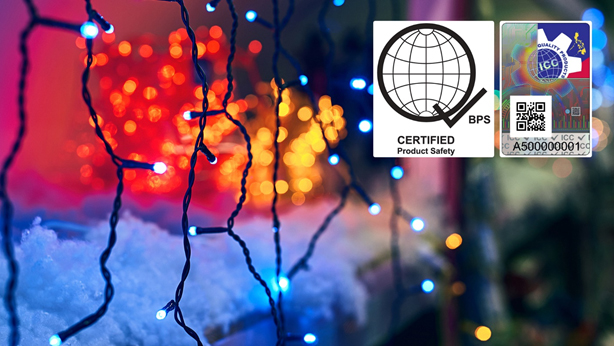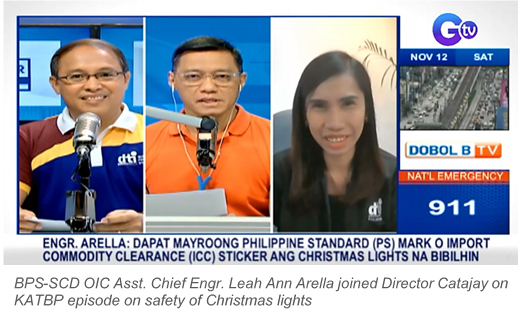
As Christmas day comes closer, the Department of Trade and Industry (DTI), through the Bureau of Philippine Standards (BPS), reminds consumers to only purchase Christmas lights that bear the Philippine Standard (PS) mark or the Import Commodity Clearance (ICC) sticker for guaranteed product safety and quality.
Christmas lights are one of the 111 products currently under the DTI-BPS list of products under mandatory certification (complete list at www.bps.dti.gov.ph). To serve as guide for consumers, the DTI-BPS has released the list of DTI-certified Christmas lights as of 09 November 2022.
- List of Valid PS Certification Mark License Issued for Christmas Lights https://tinyurl.com/PSChristmasLights2022
- List of ICC Certificates and Stickers Issued for Christmas Lights https://tinyurl.com/ICCChristmasLights2022
On the most recent episode of Konsyumer At Iba Pa (KATBP) in Super Radyo DZBB last 12 November 2022, BPS Director Neil Catajay underscored that the first thing consumers must look for when buying Christmas lights is the certification mark, either the PS mark or ICC sticker, as proof that the products have undergone the BPS certification process.



Further, the DTI-BPS gives the following additional safety reminders to consumers:
- For those who will be reusing Christmas lights from last year, carefully inspect the plug and cord of the lighting set for brittle and dented parts as the insulation material made of PVC plastic deteriorates over time.
- Dispose old and damaged Christmas lights.
- If stored Christmas lights can still be used but have burnt out bulbs, replace the burnt bulbs before using.
- Check the manufacturer’s instruction regarding the advisable number of connected sets of Christmas lights. If possible, plug each Christmas lights set directly to the electrical outlet.
- Do not overload electrical outlets. Too many plugs in one outlet may overheat the outlet and may start fire.
- Do not leave Christmas lights turned on overnight.
- Do not use nails, thumb tacks, and wire staples when hanging Christmas lights as these may damage its parts and create fire hazards. Use light hangers instead which are available in hardware and home stores.
- Read carefully the instructions on the packaging and/or the manuals of Christmas lights provided by the manufacturer.
Director Catajay also shared that the BPS is already coordinating with the UL Standards & Engagement, a global standards development organization, for possible adoption of their standards for Christmas lanterns or “parol”. He highlighted that the aim is not to regulate the “parol” products in the country but to help local manufacturers produce globally-competitive products and facilitate export of Filipino-made lanterns to international markets.
The DTI-BPS is the National Standards Body authorized to promulgate Philippine National Standards (PNS). PNS are voluntary in nature and may be used as reference by any interested parties. The conformance to PNS or parts thereof becomes mandatory only when the same is used as reference in Technical Regulations issued by regulatory authorities such as the DTI.
For more updates and information on standards, technical regulations, and conformity assessment procedures (STRACAP), please visit the BPS website (www.bps.dti.gov.ph). Emails and messages may also be sent to This email address is being protected from spambots. You need JavaScript enabled to view it. or through the official BPS Facebook page (facebook.com/PHstandards).
###